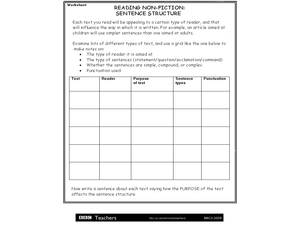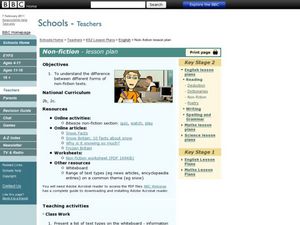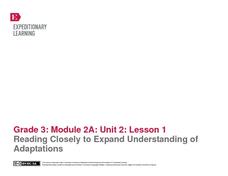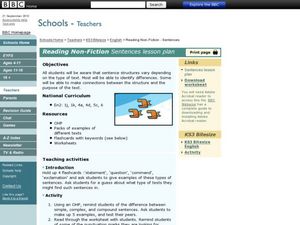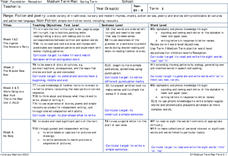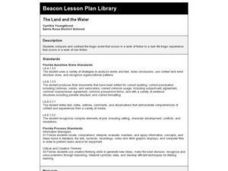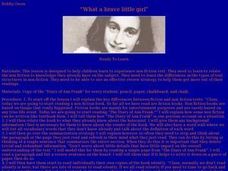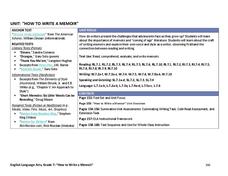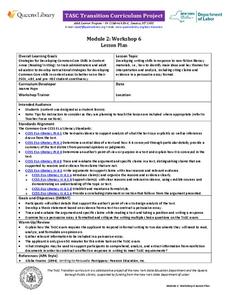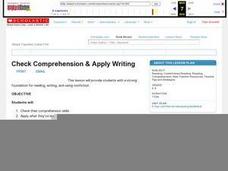Hood River County School District
Text Structure: Features and Organization
Teach learners how to interact with both fiction and non-fiction text with a packet of activities and worksheets. After looking over text structure and the difference in text features between different types of writing, readers analyze...
Curated OER
Reading Non-Fiction: Sentence Structure
Use this worksheet to help make explicit the connection between sentence structure, audience, and author's purpose. Readers track and find patterns in sentence structure in various nonfiction texts, and connect it to the purpose of the...
University of North Carolina
Paragraph Development
There's no set length for a good paragraph, but the short block of text should contain key components. A handout on paragraphs, the 12th in a series of 24, outlines a five-step process for paragraph development. Additionally, the handout...
Curated OER
Non-Fiction Texts
Third graders examine different types of non-fiction texts. In this non fiction instructional activity, 3rd graders use different types of texts to gather information. Students work in groups to analyze the texts for author's purpose,...
Ontario
Reading Informational Text
Learning to recognize the importance of the features of information text (i.e., titles, subtitles, endnotes, sidebars, etc.) is the focus of a reading activity designed for middle schoolers. Learners examine how these text features help...
EngageNY
Reading Closely to Expand Understanding of Adaptations
Third graders work to determine the main idea, recall key details, and answer questions using an informational text on the topic of animal adaptations. Using the non-fiction text "Staying Alive: Animal Adaptations" (provided) the teacher...
Curated OER
Introduction To Literary Analysis
Explore the fascinating ways in which authors use specific literary devices to create interesting and realistic texts. Using non-fiction articles with the subject of rogue waves, an excerpt from The Perfect Storm, by Sebastian Junger,...
Curated OER
Reading Non-Fiction Sentences
Students identify differences in types of sentences. In this sentence structure lesson, students discuss the different ways sentences are written according to their intended audience. Students create different types sentences and quiz...
Curated OER
Fictional Hereos
Students are introduced to the definition of a hero. As a class, they compare and contrast the difference between non-fictional and fictional hereos they have read about. They read a story, create a story map of one of the heroes and...
Curated OER
Rachel's Life is in a Hole
Explore how lack of access to water impacts peoples' lives in poor countries. Through text reading and discussion, middle schoolers are presented with the story of a young girl who lives and functions with limited water resources. They...
Curated OER
Fiction and Poetry
Students explore fictional text and poetry. They explore the story structures used in the types of texts and examine the language patterns used. Students practice tracking text in the correct manner.
Curated OER
Comparing Fiction and Nonfiction
Fifth graders compare and contrast an informational article with a fictional story. They read the story "The Contest" as a class, and discuss the different types of literature genres. Next, they complete a vocabulary worksheet and a...
Curated OER
The Land and the Water
Third graders read "The Land and the Water," a fictional short story and an article about John F. Kennedy, Jr. and compare and contrast fictional tragedy to a non-fiction tragedy. They fill out a Venn diagram and write an essay using...
Curated OER
What a Brave Little Girl
Students practice relating non-fiction to knowledge they already have on the subject. They evaluate differences in the types of text structrures in non-fiction. They employ a review strategy that allows them to understand their reading.
Curated OER
Analyzing Textbook Formats
Students explore the characteristics of a non-fiction text. In this comprehension instructional activity, students are led on a guided tour of each text and identify the features of a non-fiction text. Students continue to practice...
Curated OER
Natural Disasters: An Adventure in Non-Fiction
Students study different natural disasters. In this natural disaster lesson students read a nonfiction book followed by a discussion, an experiment, then collect illustrations from their experience.
Curated OER
Who Invented English Anyway?
In these English lesson plans, students use video, the Internet and non-fiction essays to research the history of the English language. They write a short research paper and design a PowerPoint presentation showcasing their findings.
Louisiana Department of Education
How to Write a Memoir
Who are we and what shapes our identities? Seventh graders work to answer this question as they learn how to write a memoir. Full of non-print resources and supplemental texts that range from fiction to non-fiction, scholars write their...
EngageNY
TASC Transition Curriculum: Workshop 6
Is a college education necessary for success in today's world? The class investigates the question, along with others at the end of the sixth workshop in a 15-part series. The lesson plan has four parts with multiple activities and...
Curated OER
Identify and Analyze Literary Concepts
Students explore plot structure, conflict, setting, and mood. In this literary elements lesson, students read Rosa Parks, My Story and complete the provided plot outline worksheets. Students discuss the text elements of non-fiction pieces.
Curated OER
Non-Fiction Read-aloud
Pupils listen to the reading of a book about the area of science they are currently studying.
Curated OER
Check Comprehension and Apply Writing
Elementary schoolers practice the skill of non-fiction writing. They study aspects of the famous Leaning Tower of Pisa, and write an essay which describes the tower and it's fascinating history. The article about the tower is included in...
Curated OER
Researching Lesson 4
Students explore a "table of contents." In this book researching lesson, students identify common elements of a "table of "contents" and complete a worksheet with questions about this topic.
Curated OER
Discovering Ourselves in Literature and Life
Students read literature and view other media to discover how print and non-print texts answer the thematic question: Who am I? students compare the ways ideas are presented, and create their own portfolios or personal Web pages...



